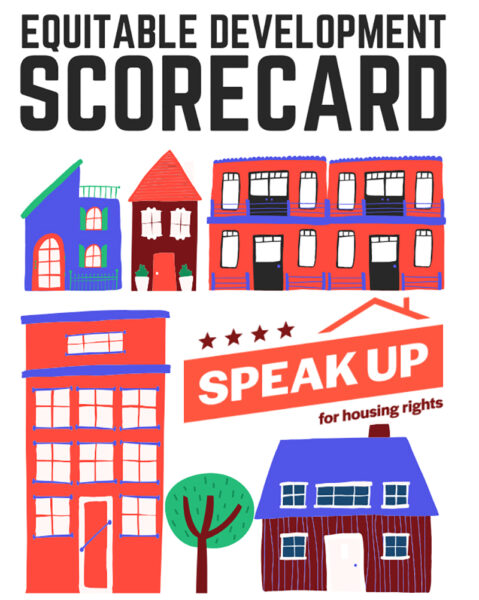
This scorecard is a uniform evaluation tool to determine if housing developments will ultimately benefit our community and address its needs for affordable housing. City staff, developers, and community members can use this scorecard to assess any proposed development.
View Scorecard

This scorecard has been adopted from a similar scorecard created by Twin Cities, Minnesota, community leaders to ensure that the principles and practices of equitable development, environmental justice, and affordability are applied in all communities as they plan for economic development and wealth creation that benefits everyone. That scorecard can be found here.
Collective Impact Lincoln worked to focus this scorecard on housing developments within the city of Lincoln based on community concerns and needs demonstrated through our conversations in our six core neighborhoods. This scorecard is designed to provide a uniform way to evaluate whether a housing development will ultimately benefit our community and address its needs for affordable housing. We hope this scorecard is useful to city staff, developers, and community members to fairly and uniformly assess any given proposed development.
This scorecard has six different sections: Equitable Decision Making, Affordable Housing, Development Accessibility, Economic Impact, Environmental Impact, and Equitable Land Use. Each section has certain criteria necessary for an equitable housing development. These criteria are scored on a scale from 0-5. After each section is scored, the total is calculated by weighing each section score and summing the weighted scores. More detail about calculating a development’s overall score is found at the end of the scorecard, beginning on page 15.
The criteria in each section were carefully selected and crafted to reflect what an ideal, equitable housing development would look like. Ideally, careful consideration and documentation of each criterion could be found in publicly available documents when a development is proposed and considered by city officials. Therefore, each of these criteria should be able to be scored on the basis of publicly available documents alone. If you feel unable to assess any given criterion due to a lack of publicly available information, that criterion should receive a zero. While all information to assess the criteria should ideally be available in public documents, this aspirational goal does not preclude the use of additional information that may come, for example, from conversations with the developer, the community, or city staff.
If you have any questions about how to use or interpret the scorecard, you can contact us at civicnebraska.org/impact or by sending us a message on Facebook or Instagram @collectiveimpactLNK.
The most important consideration for any housing development, but particularly those that receive public funds, is whether or not the development provides affordable housing to our community. Therefore, we give the Affordable Housing section of the scorecard 50% of a development’s overall score. The remaining sections are all given an equal weight of 10% of a development’s overall score.
To calculate a development’s overall score, we first determine each section’s score by dividing the number of points gained in that section by the number of points possible in that section. This will express the percent of total possible points a development gained in each section. Because there are additional criteria for Mixed-Use Developments in the Economic Impact section, the points possible for that section will depend on whether the project will have mixed uses or is solely a housing development. Next, we determine the weighted score of each section. We do this by multiplying the section score by that section’s multiplier. Finally, we determine the overall score by adding the scores of each section.
For example, if a development scored 21 points out of 35 possible points in the Equitable Decision Making section of the scorecard, the section score would be 21 divided by 35, or 60%. To determine that section’s weighted value, we would multiply 60 by 0.1, which equals 6. This process is repeated for each section, and the weighted value of each section is added to determine the overall score.
Collective Impact Lincoln worked to focus this scorecard on housing developments within the city of Lincoln, Nebraska based on community concerns and needs demonstrated through our conversations in our six core neighborhoods. This scorecard is designed to provide a uniform way to evaluate whether a housing development will ultimately benefit our community and address its needs for affordable housing. We hope this scorecard is useful to city staff, developers, and community members to fairly and uniformly assess any given proposed development.
The overall score of a development is expressed as a score out of a possible 100. While this scoring scale is largely familiar, understanding it in this context may not be entirely intuitive. The scorecard’s individual criteria are scored on a scale from 0-5, with a zero representing the lowest score possible and a five representing the highest score possible. Assuming every criterion in the scorecard was given a score of 4, a development’s overall score would be 80/100. However, a 4 represents an almost perfect score on any given criterion. For this reason, Collective Impact Lincoln has adopted the following scale to assist in our understanding of a development’s overall score:
0-19 F
20-39 D
40-59 C
60-79 B
80-100 A
This scorecard is intentionally ambitious. We believe that as a community we should have vigorous, detailed conversations about a housing development’s various impacts on our community before public support and funds are invested in the development. This scorecard is built to reflect this ideal.
Collective Impact Lincoln worked to focus this scorecard on housing developments within the city of Lincoln, Nebraska based on community concerns and needs demonstrated through our conversations in our six core neighborhoods. This scorecard is designed to provide a uniform way to evaluate whether a housing development will ultimately benefit our community and address its needs for affordable housing. We hope this scorecard is useful to city staff, developers, and community members to fairly and uniformly assess any given proposed development.
Our Work
Through policy, activism, events, and awareness campaigns, Collective Impact Lincoln and partners take daily action to address our housing crisis.

Get
connected
We can all act right now to end the eviction crisis in our community. Here is an assortment of ways to get involved, no matter your time or resources.
Tell your
story
Everyone in our community has a story. As we move forward together, Speak Up is sharing stories from Nebraskans who are directly affected by housing insecurity and eviction through a series of short films and other media.
Learn
more
From Matthew Desmond's seminal work Evicted to local stories and information that put a human face on the housing crisis, there are no shortage of ways to learn more about the issue before us – and what it will take to solve it.
Take
action
Whether you are directly affected by housing instability or if you simply care about others and want your community to thrive, you can act today.

